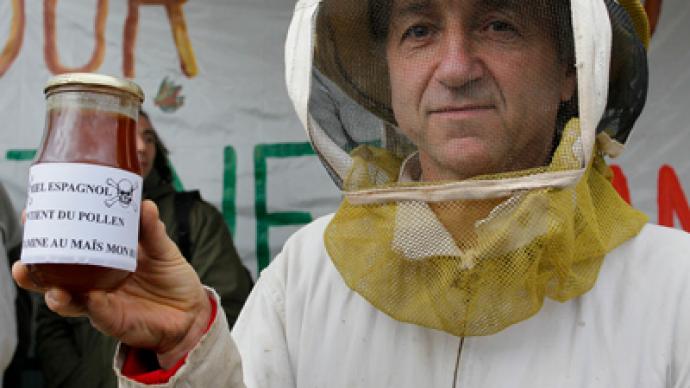Farmers demand feds probe Monsanto and Dow over crops and chemicals

Over 2,000 farmers and others within the food industry are threatening to take the US government to court to make sure that feds act quickly in investigating the potential outcome of a new genetically modified crop.
A coalition of concerned members of America’s agriculture community said on Wednesday that they will take legal action to ensure that the federal government investigates what will happen if biotech companies are allowed to proceed with a space-age, man-made variant of corn. As RT reported last week, Dow Chemical is awaiting the government’s go-ahead to start using a mutated corn crop that is resistant to a powerful pesticide produced with 2,4-D, the same compound crucial to the make-up of the notorious Vietnam War-era killer Agent Orange. Once approved, the new corn will be able to thrive as farmers douse their fields in the pesticide, eradicating unwanted weeds in the process. Opponents are concerned that the aftermath of a surge in the chemical’s use could be catastrophic for people, plants and the agriculture industry as a whole, though."These are the most dangerous chemicals out there," attorney John Bode tells Reuters. Bode is fighting on behalf of the Save Our Crops Coalition to have Washington intervene and is no stranger to how the government goes about these matters — he served as assistant secretary of agriculture in the Reagan administration.While The Natural Resources Defense Council has tied 2,4-D to cases of cancer, genetic mutations and neurotoxicity, it’s not even just humans that are expected to be affected by the pesticide. “These herbicides have been known to drift and volatilize to cause damage to plants over 10 miles away from the point of application,” the Save Our Crops Coalition pleads.Last week the Environmental Protection Agency threw out a petition that asked them to ban the sale of the pesticide. Despite pleas from opponents at the National Resource Defense Council and the Center for Food Safety, the EPA said they would continue to allow the pesticide in question to be sold. While 2,4-D is currently a regularly used chemical in crop fields, the expected introduction of a corn variant immune to it is expected to cause a spike in sales — and, in turn, disease.“There’s no reason to continue allowing a toxic Agent Orange-ingredient in the places our children play, our families live and our farmers work. EPA must step up and finally put a stop to it,” Dr. Gina Solomon, of the UCSF OEM Residency and Fellowship Program wrote.In addition to Dow’s plan to use 2,4-D on crops immune to its effects, the Monsanto corporation is also planning a new crop that will be resistant to a similar herbicide made with the herbicide dicamba."The danger that 2,4-D and dicamba pose is a real threat to crops…nearly every food crop," Steve Smith, director of agriculture at Red Gold, tells Reuters. Red Cold, the world's largest canned tomato processor, is joined in the opposition by companies that grow crops for brands including Del Monte and Seneca. Members of the Save Our Crops Coalition also include the Indiana Vegetable Growers Association and the Ohio Produce Growers and Marketers Association.Although the EPA has decided to continue the sale of 2,4-D, the Save Our Crops Coalition is asking the agency to conduct a Scientific Advisory Panel meeting and draft advisors to oversee a panel that would address the issue of herbicide spray drift. They are also demanding through their lawyers that the US Department of Agriculture (USDA) investigate what impact could occur if the new crop is approved and pesticide sales go up. The US federal regulatory process requires both the EPA and USDA to respond to the coalition’s legal petition. After which, they can file a federal lawsuit to demand answers.














